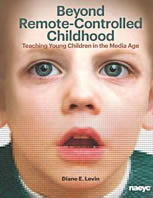Beyond Remote-Controlled Childhood: Teaching Young Children in the Media Age.
(September 2013) by Diane E. Levin. NAEYC
www.dianelevin.com
 Beyond Remote-Controlled Childhood takes us in the early childhood profession into the strange new territory of young children’s lives in the North American culture of the 21st Century, guiding us through the complex and pervasive cultural and educational minefields of technology that we all live through each day. Diane’s first book in this series, Remote Control Childhood? Combating the Hazards of Media Culture came out in 1998, just before the World Wide Web exploded the use of computers throughout the world, and well before portable video games, DVD players, and cellular telephones got so popular. The intervening years have seen television retain its hold on our time and attention, while computers, video game consoles, cell phones, smart phones and tablets now make screen technology ever-present in our lives.
Beyond Remote-Controlled Childhood takes us in the early childhood profession into the strange new territory of young children’s lives in the North American culture of the 21st Century, guiding us through the complex and pervasive cultural and educational minefields of technology that we all live through each day. Diane’s first book in this series, Remote Control Childhood? Combating the Hazards of Media Culture came out in 1998, just before the World Wide Web exploded the use of computers throughout the world, and well before portable video games, DVD players, and cellular telephones got so popular. The intervening years have seen television retain its hold on our time and attention, while computers, video game consoles, cell phones, smart phones and tablets now make screen technology ever-present in our lives.
Diane, in her new book, leads us and the children and families we care for beyond the lures and addictions that the ever-present screens present us, to reclaim our real relationships, our time, our play, our self-confidence, and our discernment of what’s still valuable in the world of screens and ringtones. It’s a major feat that Diane accomplishes in a very user-friendly way, with an abundance of stories, examples, references and common-sense ideas and suggestions for action based on extensive research and experience.
The book starts with an analysis of the current technological and cultural challenges to children’s wholesome growth, then goes into step-by-step ideas for teachers and parents to implement with their children, helping the children to connect with the real world, take charge of their screen time and toy use, play constructively, and move beyond the scripts imposed by modern electronics. When the teachers, the children, their families and their communities can work together on these issues, everyone wins. With this book Levin helps all of us to understand and cope with what’s here now and what’s likely to come next.

